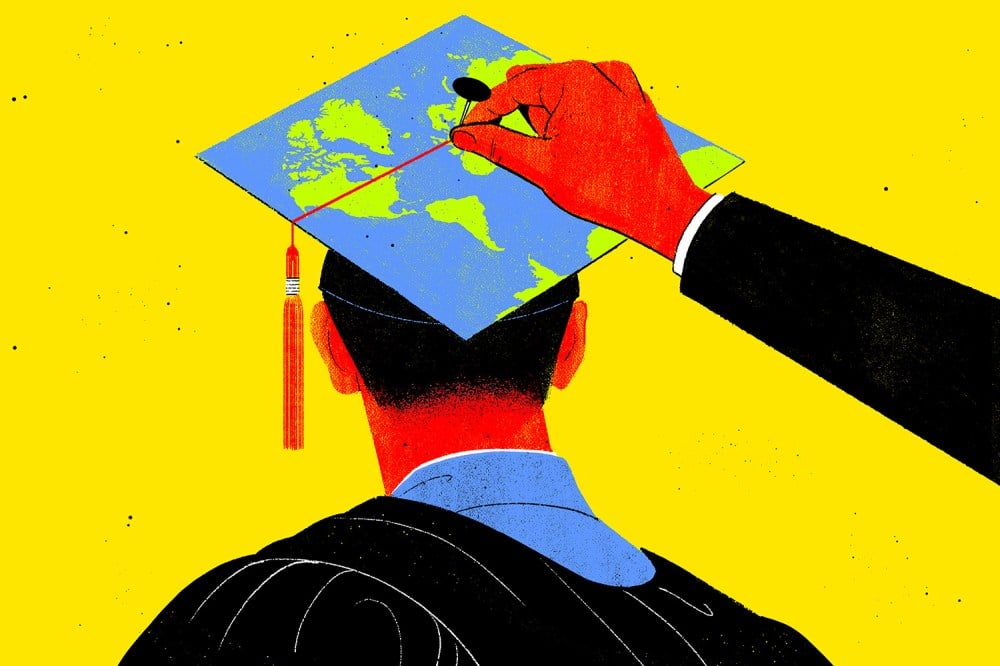As students return to their campuses after what was hopefully a busy and productive summer—or as recent graduates begin to reckon with the realities of post-university life and the job market—this is an ideal moment to take stock. If you’re interested in a career in international affairs, now is the time to begin thinking strategically about how to land that all-important first job.
After nearly 25 years working in international affairs—first as a young U.S. Army officer during the early years of the so-called global war on terror, then as a rare U.S. national appointed as a special advisor in the British government, and later in leadership roles at major Washington think tanks—I’ve had the privilege of mentoring hundreds of undergraduate students and interns. Many of them have asked me the same question: How do I land my first job in international affairs?
These repeated conversations prompted me to write this article. While there’s no single formula, there are practical, proven ways to improve your chances. What follows is a collection of my best advice to help graduates and early career professionals step into the world of international affairs.
1. Should you go to grad school now or later?
This is one of the most frequent questions I get when I speak with undergraduates. Graduate school is a major investment. Don’t rush into it unless you’re confident about the issue area you want to study. Getting a few years of real-world work experience under your belt will sharpen your focus and make you a stronger candidate when you do apply.
That said, if you’re a recent graduate and struggling to land your first job—and already know exactly what you want to study—there’s nothing wrong with an early start with grad school. For better or worse (and I think for worse), a graduate degree is increasingly a requirement for serious career advancement in the foreign policy field.
One option worth considering is doing your master’s abroad. In the United Kingdom, for example, many programs last only one calendar year, making them more affordable than the standard two-year U.S. degree. Universities in the non-English-speaking world, especially in continental Europe, offer a profusion of international graduate programs in English at relatively low cost. You’ll also gain valuable international exposure and build a network of peers from around the world.
2. What about law school?
Washington is full of people with law degrees who never practice law. Law school is a major commitment—of time, money, and energy—and should only be pursued if you have a burning desire to practice law or plan to work in a position where a law degree is strictly required. It’s not a decision to take lightly, especially when there are alternative paths into foreign policy that don’t require such an intense financial and personal investment.
If you just want to work in international affairs, a law degree might look impressive on paper, but it won’t necessarily give you the tools or network you need to break into the field. A well-chosen master’s degree may be a better fit and could provide more directly applicable knowledge and connections.
That said, there are some narrow areas in foreign policy that depend on legal expertise, such as trade law, human rights law, treaty law, and other aspects of international law. But think carefully before committing yourself to this track.
3. International experience is a requirement.

Entry-level jobs in foreign policy are rare and attract hundreds of applicants. You need to make your résumé stand out, and one of the best ways to do that is with international experience.
You can’t claim to be a credible Africa analyst if you’ve never set foot on the continent. That doesn’t mean you need to have worked abroad for years, but you do need to show initiative and willingness. At a minimum, that could mean studying abroad, backpacking internationally, or taking an immersive language course.
There are also more structured options. In some countries, you’ll find language programs where you not only study a foreign language but live and interact within a different cultural environment. These programs can last anywhere from a few weeks to several months and offer valuable experience that is both educational and personally enriching.
Additionally, several countries operate formal programs that place native English speakers into their public schools—often elementary schools—to assist with English instruction. These placements usually include travel reimbursement and a modest living stipend, and they offer a great opportunity to gain teaching experience, learn about another society from the inside, and develop the intercultural skills that are essential in foreign policy work.
I understand that getting overseas can be expensive, but there are ways to cut costs. Instead of studying abroad in Paris or London, look at more affordable options like Cape Town (which is what I did). Many U.S. universities offer study abroad programs in less pricey destinations that still provide a rich educational and cultural experience. Seek out scholarships, especially those specifically geared toward international study. And if studying abroad isn’t feasible, consider working at the embassy or consulate of a U.S. ally as a local hire or at one of the World Affairs Council chapters dotted around the United States. These positions are often accessible to recent graduates and provide insight into diplomacy and foreign cultures without leaving the United States.
Regardless of how you do it, time abroad is a must. It is an absolute necessity that anyone working in international affairs or foreign policy, even at the most junior level, has spent time overseas. Having a passport—and using it—is foundational to this line of work, even if your first overseas experience was backpacking on a shoestring budget.
Depending on where you are in your career, the expectations around overseas experience will differ. For those just starting out or looking to land an entry-level position, a few weeks of budget travel through a region of interest can still make a meaningful impression. It shows curiosity, initiative, and a willingness to engage the world beyond your borders. Later in your career, of course, more sustained and specialized international experience will be expected.
This is also a good time to check your passport. Make sure it’s valid. You never know when an opportunity might arise to attend a young leaders’ program in another country, travel with your supervisor, or represent your school or organization at a conference abroad. You don’t want to miss out because your passport has expired—or worse, because you don’t have one at all.
4. Internships matter more than you think.
Internships open doors. They provide hands-on experience, strengthen research and writing skills, and build networks. Many organizations hire from their own intern pools. While unpaid internships are unfortunately still common, several summer programs at Washington-based think tanks and nonprofits now offer stipends and housing. Seek those out.
Don’t overlook the fact that internships often serve as informal job interviews. If you’re enthusiastic, reliable, and capable during your internship, you’re far more likely to be remembered when a full-time position becomes available. Internships are also an excellent way to test different types of organizations and roles before committing to a specific career path.
Just remember: You get out of an internship what you’re willing to put in. If you take the opportunity to find and study under mentors; to network with other interns and colleagues around town; and seek out ways to contribute (whether through conducting research, drafting articles, compiling talking points, or helping organize public events), you will learn far more than the intern who simply shows up from 9 to 5 and checks the box.
5. Real jobs teach real skills.
If you need a way to pay for internship living expenses, consider getting a real job. Too many applicants have polished résumés but no real-world work experience. Don’t underestimate the value of a job in the service industry. Waiting tables, pulling pints, or driving for Uber builds people skills—skills that transfer directly to foreign policy work.
Why? Because so much of foreign policy involves dealing with people from all walks of life, from every corner of the world, who come from vastly different circumstances. Knowing how to communicate clearly, listen attentively, and respond thoughtfully across cultural and social boundaries is essential. Customer-facing jobs teach you to do just that, often under pressure.
These aren’t just filler jobs—they’re foundational experiences that demonstrate your ability to engage respectfully and effectively with others, which is at the heart of diplomacy and international affairs. In fact, I’ve chosen one candidate over another in the final interview round because they had a barista job on their résumé. It showed work ethic and humility. In this field, the ability to communicate with people from various backgrounds is essential.
If haven’t worked at McDonald’s, as a lifeguard at the local pool, or mowing lawns as a teenager, then consider earning some cash with a service job now. Your first job shouldn’t be as a recent college graduate on Capitol Hill. The foundational skills you gain from real-world, service-oriented work are far more transferable—and often more respected—than you might think.
6. Build a real network.
In foreign policy, whom you know often matters just as much as what you know. Many organizations in this field—particularly think tanks and NGOs—don’t have large human resources departments. When a junior position opens up, the manager who is hiring doesn’t have time to sort through hundreds of applications. More often than not, they’ll rely on their personal networks to identify promising candidates.
That means you need to be on their radar. Attend public events. Follow up with people you meet. Build real relationships, not just transactional ones. If you interned somewhere, stay in touch with your supervisors and colleagues. If someone gave you advice or took a coffee meeting with you, thank them and keep them posted on your progress.
Cities like New York or Washington may seem big, but the foreign policy community is small. Make yourself known in the community, and people will begin to think of you when opportunities arise. Networking isn’t about schmoozing, free booze, and a vast collection of LinkedIn contacts, it’s about showing people that you’re committed, capable, and someone they would want to work alongside.
7. Find mentors, and don’t be afraid to reach out.
Identify the people in your field whose work you admire. Read their bios. Study how they got to where they are. Then reach out—respectfully. Ask for 20 minutes on Zoom or a quick coffee. You’d be surprised how often people say yes. Better yet, seek out internship possibilities with them. There is no better way to learn from mentors than to work for them.
Most professionals remember what it was like to be starting out. If you’re polite, prepared, and clear about what you’re hoping to learn, many will be willing to talk. A good mentor can help guide your career, provide honest feedback, and open doors when the time is right. But you have to take the first step.
8. Write, publish, and share your ideas.
If you want to be taken seriously in this field, you have to write. Publishing shows you can articulate ideas clearly and contribute meaningfully to the policy conversation.
But start small; don’t pitch your first article to Foreign Policy. Try student journals, local newspapers, or niche policy blogs. Better yet, submit a full draft—not just an idea—and in your email, explain why it’s relevant now. Editors appreciate contributors who make their jobs easier. You can often find editors’ contact information on a publication’s website or LinkedIn.
And if no one publishes your work right away, don’t get discouraged. Start a Substack or Medium page to build a portfolio. Having a body of work to point to—however modest—can make all the difference when you’re applying for that first job.
On the other hand, remember that anything you write can and will be found by future employers. Keep it thoughtful, professional, and grounded—even when expressing strong views.
9. Be your own advocate.
In a place like Washington, no one will advocate for you more than yourself. Most hiring decisions are made quickly and informally. With entry level positions in international affairs receiving hundreds of applications, organizations look for someone who’s already on their radar.
That’s why it’s so important to build relationships before you need them. It’s also why you can’t afford to be passive. If a job opens and you don’t apply, no one is going to come looking for you.
Yes, it can feel uncomfortable to promote yourself, but if you don’t advocate for yourself, who will? Making your case—on paper, in person, over email, or at a networking event—is a crucial skill. Learn it early and use it often, but do so subtly and with modesty.
10. Be smart about social media.
This advice may seem obvious, but it cannot be said enough: Be very careful about what you post online. At this stage in your career, your online presence is an extension of your résumé. Future employers will almost certainly look you up, and your social media accounts can either reinforce your professionalism—or tank your chances entirely.
If you want to maintain a personal online presence, keep it either private or anonymous. Better yet, start cultivating a professional digital footprint. Set up a dedicated X account focused on foreign policy commentary, for example. Use LinkedIn to follow thought leaders, share articles, and engage in respectful discussion about international affairs.
There have been real cases where otherwise qualified candidates were cut from the final hiring round because of a careless meme or photo buried deep in their online history. In one such instance that I’m familiar with, a politically controversial Pinterest post derailed someone’s application at the final stage. You never know who’s watching or what they might find inappropriate.
In short, don’t give someone an easy reason to say no. Be thoughtful. Be professional. Think before you post.
11. Understand salary—but know your worth.
Be realistic about your salary expectations. Entry-level positions in foreign policy often come with low starting salaries, especially in Washington. But that doesn’t mean you shouldn’t know your worth.
Do your research. Understand what typical compensation is for someone in your role with your education and experience. And if the salary you’re offered is too low, don’t be afraid to negotiate professionally and respectfully. You might not always get more, but you’ll show that you value your own work.
And remember, the salary you start with often sets the baseline for future raises and promotions. It’s not always easy to make a big jump later, so be thoughtful about what you’re willing to accept now.
12. Always be looking for the next best thing.
In the early stages of your career, you need to keep your eye on the next best thing. That might mean looking for advancement within your current organization or keeping an eye out for better opportunities elsewhere.
A good rule of thumb is that once you’ve been in your first full-time role out of college for 18 to 24 months, it’s time to start thinking about the next step. That doesn’t mean you should leave automatically or right away—but you should be having conversations, scanning job boards, and figuring out what skills or experience you need to level up.
Many young professionals hesitate to job hunt out of loyalty or fear of how their employer might react. But if you’re in your early 20s and working in an entry-level position, it would be strange not to be thinking about growth. And if your employer can’t understand that, that’s their problem—not yours. As long as you handle things professionally, there’s nothing wrong with looking to advance.
And if they truly want to keep you, they’ll find a way to offer a clear path forward—whether it’s a raise, a new title, or more responsibility. Career growth is your responsibility. Don’t wait for permission.
To conclude all this advice: Stay positive and keep going. Breaking into the foreign policy space—or any entry level job in any field—is hard. It takes time. It’s frustrating. But don’t quit. There’s more movement in the labor market than you might think, especially at the junior level.
You will send out applications and hear nothing. You’ll get interviews and not get the offer. That’s all part of the process. Keep applying. Keep networking. Keep building your skills. Eventually, something will bite.
And when it does, all the effort will have been worth it.
The post So You Want to Work in International Affairs appeared first on Foreign Policy.




